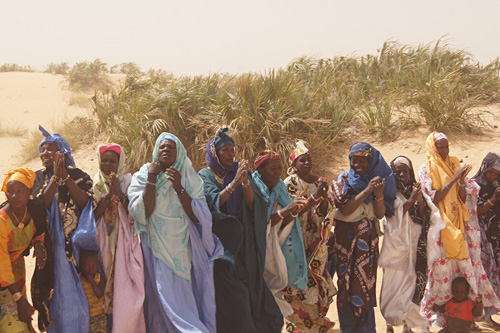
Mission
Caravan to Class is an all-volunteer charitable organization with the very focused mission of bringing literacy to the children of villages around Timbuktu in Mali, West Africa.
Life Challenges of the Women Served
Once known as a cultural and educational center, Timbuktu has undergone numerous challenges. High population growth rates and drought in Mali have fueled food insecurity, poverty and instability. In the Timbuktu region, more than 77 percent of the population lives in severe poverty and roughly half of the villages are without schools. The United Nations Development Program has ranked Mali 150 out of 155 in its gender inequality index.
Despite being part of a matriarchal culture, women in Mali are deeply impacted by their lack of education and the severe poverty rate. Women in Timbuktu are usually illiterate, have not attended school and often do not believe they need to send their daughters to school. Subsequently, a classic cycle of poverty emerges, with daughters marrying young and giving birth at young ages. Life in the villages is hard, and parents believe their children (especially girls) must help by doing chores such as gathering water, herding goats and finding wood for fuel. Many of the villages are relatively new villages where residents were formally nomadic. Children of women who have never received an education are 50 percent more likely to die before the age of 5. Illiterate women in Africa are 3 – 5 times more likely to get HIV/AIDS.
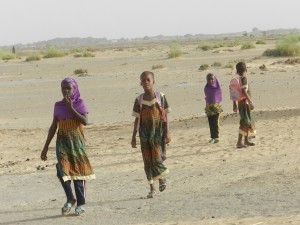 In addition, women in Timbuktu have been impacted by the political and security situation in Mali. In early 2012, a military coup and an occupation of the northern regions by rebel and criminal groups resulted in Timbuktu being taken over by Ansar Dine, a militant group linked to Al Qaeda. Strict Sharia Law was imposed, ancient cultural treasures were destroyed and thousands of village residents became refugees in neighboring countries. This political, institutional and security crisis profoundly destabilized the country in all areas and had serious consequences for the rights of women and girls. Women falsely accused of breaking the law were subject to being flogged and publicly stoned, and cases of forced marriage were reported in all areas that were under occupation. This included cases of young women who were forced into marriage with members of armed groups under circumstances where the marriage was simply arranged to give a cover of legitimacy to kidnappings and rapes.
In addition, women in Timbuktu have been impacted by the political and security situation in Mali. In early 2012, a military coup and an occupation of the northern regions by rebel and criminal groups resulted in Timbuktu being taken over by Ansar Dine, a militant group linked to Al Qaeda. Strict Sharia Law was imposed, ancient cultural treasures were destroyed and thousands of village residents became refugees in neighboring countries. This political, institutional and security crisis profoundly destabilized the country in all areas and had serious consequences for the rights of women and girls. Women falsely accused of breaking the law were subject to being flogged and publicly stoned, and cases of forced marriage were reported in all areas that were under occupation. This included cases of young women who were forced into marriage with members of armed groups under circumstances where the marriage was simply arranged to give a cover of legitimacy to kidnappings and rapes.
In January 2013, United Nations forces, led by France, liberated Timbuktu. However, women are dealing with the physical and psychological consequences of the violence that was inflicted on them during the armed conflict.
The Project
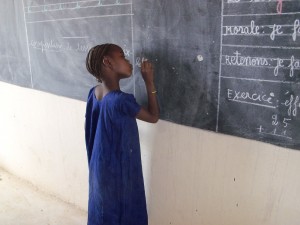 CTC believes education is the key to breaking the cycle of poverty and inequality in Timbuktu. CTC has completed nine school construction projects since its inception in 2010. Schools are built in carefully selected villages with a holistic approach and strong village engagement, and then the schools are supported for three years using a phased approach to ensure long-term sustainability.
CTC believes education is the key to breaking the cycle of poverty and inequality in Timbuktu. CTC has completed nine school construction projects since its inception in 2010. Schools are built in carefully selected villages with a holistic approach and strong village engagement, and then the schools are supported for three years using a phased approach to ensure long-term sustainability.
In the 2015-16 school year, CTC developed and launched a Female Adult Literacy pilot program in the village of Tourari. This program was created to help mothers develop basic literacy skills so that they can improve their livelihoods and those of their families. Just as importantly, through this program they can also know the joy and hope that comes with literacy and be strong advocates for educating their children, thereby breaking the cycle of illiteracy. By partnering with DFW, CTC will expand this program to ten additional villages.
The Female Adult Literacy project will provide a 180-day literacy program to teach classic literacy in the local languages of Tamashek and Sonrai to 200 women (20 from each village, five villages per year for two years), so that they can achieve basic reading, writing and calculating skills in their own language. Via a 90-day post-literacy program, the project will engage the women in leadership opportunities that come from developing basic literacy skills, and engage them in a dialogue about important issues and challenges in their villages.
Facilitators/teachers will be chosen by the Ministry of Education/Academy of Teaching with the basic requirement of certification. There is a preference for the facilitator/teacher being from the village, as long as certification can be obtained. Once facilitators/teachers are chosen in each village where a Female Adult Literacy project will take place, a meeting will be convened of women in the village and the teacher to select the participants. Priority will be given to women who are not literate, who have no formal schooling and who are committed to attending the full course of the program. The goal is to get women who can benefit most (those with a low level of literacy or no literacy at all) but who are also very committed to attending the classes.
The Female Adult Literacy project will promote self-sufficiency for women and girls by providing them a greater ability to make decisions about personal and family health. Women who are literate can contribute to their families’ economy by participating in local crafts collectives or by selling food at village markets. They are better able to participate in local decision making in their own communities.
The two-year project will directly impact 100 women each year (200 total), and will indirectly serve 1,000 direct family members and 6,750 individuals in the 10 villages over the duration of the project.
Sustainable Development Goals
![]()
![]()
![]()
Questions for Discussion
- How do you think this project will promote women entering leadership roles in Timbuktu?
- How does the project help to reduce childhood pregnancy, increase health and reduce poverty?
- What impact do you think this project will have on gender inequality in the area?
How the Grant Will be Used
DFW’s donation of $42,260 for two years will pay for salaries for the facilitator/instructors, the Ministry of Education for their work in monitoring and evaluating the projects and administrative salaries. It will also cover program material expenses. Refreshments and nutrition are included since food insecurity is one of the main challenges faced in the area. The total cost per direct beneficiary is $211.
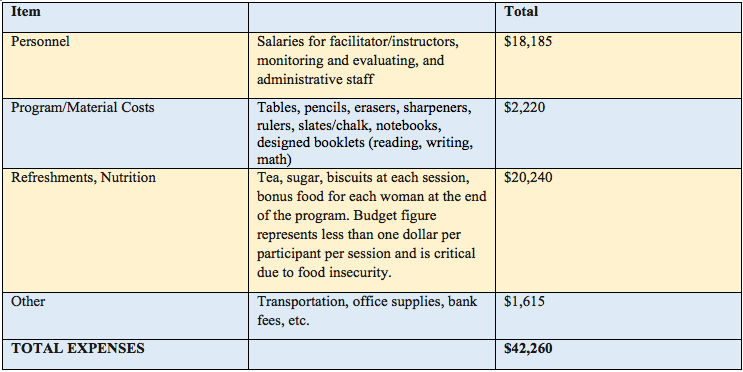
Why We Love This Project/Organization
We love this project because it brings literacy skills to former nomadic populations who are seeking a more settled life. The literacy skills will allow leadership skills to emerge among beneficiary women, increase their ability to make health and economic decisions for themselves and their families, and increase their engagement with their communities.
Evidence of Success
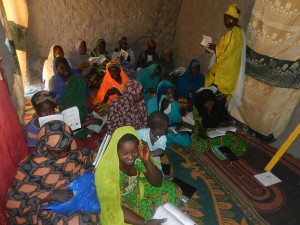 Since its founding in 2010, CTC has built and supported nine successful schools reaching more than 1,200 children each year, more than 50 percent of whom are girls. Since 2010, more than 5,000 individual students have attended schools built by CTC. Most of these children had no prior formal schooling. CTC has provided roughly 500,000 basic meals to students and has paid teacher salaries for approximately 25,000 teacher-days of school. It has exceeded the target of getting more than 70 percent of the children in each village to attend school regularly, with some schools approaching 90 percent. The Female Adult Literacy pilot program conducted in 2015 – 2016 proved very successful. In addition to expanding the program to additional villages and making the Female Adult Literacy Program part of CTC’s core package of support for education in the villages where it works, this project will also increase the instruction time from three hours per day for three days per week used in the pilot program to four hours per day for four days per week with this project.
Since its founding in 2010, CTC has built and supported nine successful schools reaching more than 1,200 children each year, more than 50 percent of whom are girls. Since 2010, more than 5,000 individual students have attended schools built by CTC. Most of these children had no prior formal schooling. CTC has provided roughly 500,000 basic meals to students and has paid teacher salaries for approximately 25,000 teacher-days of school. It has exceeded the target of getting more than 70 percent of the children in each village to attend school regularly, with some schools approaching 90 percent. The Female Adult Literacy pilot program conducted in 2015 – 2016 proved very successful. In addition to expanding the program to additional villages and making the Female Adult Literacy Program part of CTC’s core package of support for education in the villages where it works, this project will also increase the instruction time from three hours per day for three days per week used in the pilot program to four hours per day for four days per week with this project.
Voices of the Girls
“Although the spirit of inequality of women in general is still in the minds, with the Female Adult Literacy program we are now more committed to reversing this trend.”
– Aichata Wallet Mohha, Female Adult Literacy program attendee, Tourari village
“This program has changed our lives a lot in the sense that before the program, most of us really had no concept of reading and writing in our language. But today, thank God for this literacy program, we can read, write and make calculations in Tamashek. This has not only given us such practical gifts, but also ideas in our minds to go and seek out the Director to find ways of further learning.”
– Fadimata Mohamed, Female Adult Literacy program attendee, Tourari village
“Caravan to Class helps assure a good education for all students which guarantees us a better future. I love to read – read a book or a letter to my parents who cannot read…or simply to be able to read information about some place far away.”
– Fadimata Wallet, 6th grade, Tedeini school
“I am very happy today thanks to Caravan to Class and our new school. Every morning I wake up early to do my chores and quickly get to school on time. After my studies I would like to be a nurse in order to help my village.”
– Zeynabou Souleymana, 4th grade, Kakondji school
About the Organization
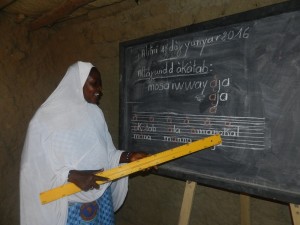 Caravan to Class (CTC) was founded in 2010 after the founder, Barry Hoffner, realized a childhood dream and visited the fabled Timbuktu, Mali, West Africa. Captivated by the city’s interesting and hospitable people, the music, the desert and its fascinating history, he decided to celebrate his 50th birthday by building a school in Tedeini, a village he had visited.
Caravan to Class (CTC) was founded in 2010 after the founder, Barry Hoffner, realized a childhood dream and visited the fabled Timbuktu, Mali, West Africa. Captivated by the city’s interesting and hospitable people, the music, the desert and its fascinating history, he decided to celebrate his 50th birthday by building a school in Tedeini, a village he had visited.
He returned six months later to see the children successfully learning French in their new school. He was so inspired by the students’ dedication to learning and their families’ interest in their education that he decided to expand educational access to other nearby villages. Since then, the focus of CTC has been to make “going to school” a routine part of life for children in these villages, and literacy for Timbuktu the long-term goal of CTC.
Where They Work
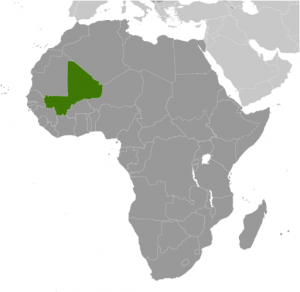
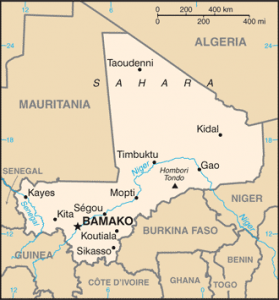 A land-locked country in West Africa, the Republic of Mali is home to 17 million people, more than half of whom are children. In recent years, chronic challenges and devastating crises have affected Mali. Today, Mali is ranked 182 out of 187 countries on the Human Development Index, and half of the population lives in poverty. Gross domestic product (GDP) growth, estimated at 5 percent in 2013, is below the 7 percent target for reducing poverty, while population growth is among the highest in the world at 3.6 percent.
A land-locked country in West Africa, the Republic of Mali is home to 17 million people, more than half of whom are children. In recent years, chronic challenges and devastating crises have affected Mali. Today, Mali is ranked 182 out of 187 countries on the Human Development Index, and half of the population lives in poverty. Gross domestic product (GDP) growth, estimated at 5 percent in 2013, is below the 7 percent target for reducing poverty, while population growth is among the highest in the world at 3.6 percent.
Mali has a long history of seasonal migration and emigration driven by poverty, conflict, demographic pressure, unemployment, food insecurity and droughts. Many Malians from rural areas migrate during the dry period to nearby villages and towns to do odd jobs or to adjoining countries to work in agriculture or mining. Pastoralists and nomads move seasonally to southern Mali or nearby coastal states. Others migrate long term to Mali’s urban areas, Cote d’Ivoire, other neighboring countries, and in smaller numbers to France, Mali’s former colonial ruler.
The median age in Mali is 16.2 years, with a median age for males of 15.5 years and 16.8 years for females. Maternal mortality rates are 587 deaths/100,000 live births (2015 est.). Infant mortality rates are 100 deaths/1,000 live births. The mother’s mean age at first birth is 18.8 years. The literacy rates in Mali (age 15 and over can read and write) are 38.7 percent for the total population, 48.2 percent for males, and 20.2 percent for females. Life expectancy for the total population is 55.8 years, with a male life expectancy of 53.9 years and a female life expectancy of 57.7 years.
A Closer Look at the Timbuktu Renaissance
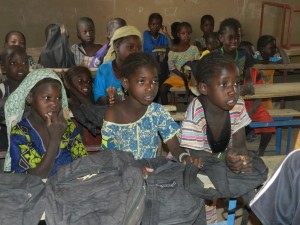 For centuries, Timbuktu was a vibrant crossroad of trade, culture, scholarship and religious tolerance. In addition to a number of UNESCO World Heritage sites, Timbuktu was also home to one of the world’s most ancient and important collections of manuscripts, a world-renown music festival, and is considered the birthplace of the blues.
For centuries, Timbuktu was a vibrant crossroad of trade, culture, scholarship and religious tolerance. In addition to a number of UNESCO World Heritage sites, Timbuktu was also home to one of the world’s most ancient and important collections of manuscripts, a world-renown music festival, and is considered the birthplace of the blues.
In 2012, Al Qaeda-linked terrorists invaded and occupied this historic city. They committed grave human rights abuses, damaged mausoleums and shrines, torched manuscripts, and banned books, sports and music. A coalition of forces supported by the U.N. and led by the French, liberated Timbuktu and drove out the terrorists, but the peace remains fragile. The economy – mostly based on artisan crafts, commerce, and tourism – has been ripped apart.
Thanks to the resilience and ingenuity of the local population, including a high-risk operation by a band of Timbuktu librarians to save precious centuries-old Arabic texts from Al Qaeda by sneaking all 350,000 volumes of the ancient manuscripts out of the city, and the return of music to Timbuktu, hope and pride have been returned to the city. In an initiative to leverage culture as the heart of peace-building and socio-economic development, an alliance between the Brookings Institution and the Government of Mali entitled the Timbuktu Renaissance has been developed. The Timbuktu Renaissance’s integrated strategy will boost Mali’s creative industries, including tourism, literature, architecture, music, film and artisan crafts, and mobilize investment for sustainable economic development initiatives ranging from education and agriculture to renewable energy and transparent natural resource development.
Learn more about the Timbuktu Renaissance through this video.
Source Materials
The Timbuktu Renaissance Organization
Sources:
Sources:
The Bad-Ass Librarians of Timbuktu and Their Race to Save the World’s Most Precious Manuscripts by Joshua Hammer
